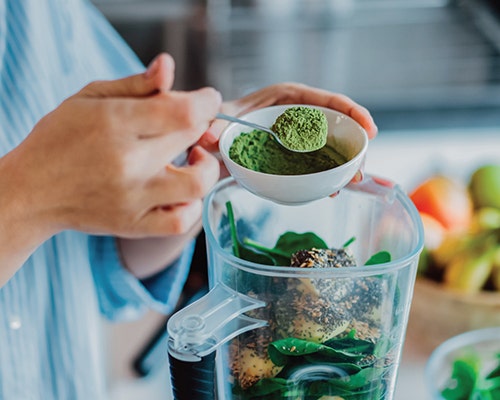Eat to Treat the Top 5 Nutrient Deficiencies
- 2/8/19

by Tracey Pollack
Feeling well demands eating well, which is why it’s essential to eat a balanced diet full of nutrient-rich foods. Yet today’s typical diet lacks many vitamins and minerals that feed our body’s basic needs. Without these nutrient-filled foods, your body won’t function at its best. If you’ve been unusually weary or moody, you may have a nutritional deficiency. The way to prevent or resolve the problem is knowing the top nutrient deficiencies and how you can eat to beat them.
They don’t call these nutrients essential for nothing! Avoid the pain and problems of deficiencies by getting your fill through food.
Feeling well demands eating well, which is why it’s essential to eat a balanced diet full of nutrient-rich foods. Yet today’s typical diet lacks many vitamins and minerals that feed our body’s basic needs. Without these nutrient-filled foods, your body won’t function at its best. If you’ve been unusually weary or moody, you may have a nutritional deficiency. The way to prevent or resolve the problem is knowing the top nutrient deficiencies and how you can eat to beat them.
- Pump Iron – Tired of being exhausted, weak, cold and short of breath? Wake up to the fact that you may have an iron deficiency. Relax, you’re not alone since this is one of the world’s most common nutrient deficiencies, especially among women, preschool children, vegetarians and vegans. See, every cell in your body needs iron to move oxygen through the blood stream. Too little will leave you constantly needing a nap and prone to illness. To lift your iron levels, reach for red meat, oysters, chicken, turkey, iron-fortified cereals, spinach and lentils. Enjoy them with vitamin C-rich foods like oranges, bell peppers, strawberries and kale to maximize iron’s absorption.
- See the Bright Side of Vitamin D - This nutrient deserves its place in the sun for its power to boost your bone strength, fight infections, enhance brain health and brighten your mood. Vitamin D is only made when your skin is exposed to sunlight, but far too many people get far too little exposure. Luckily, a vitamin D deficiency can be avoided or corrected by spending time in the sun each day, along with eating vitamin-D-packed foods, such as fortified milk, yogurt, egg yolks and fatty fish like salmon and tuna. Since so few foods contain this needed nutrient, taking a vitamin D supplement is also a bright idea.
- Go to Plan B12 – Red alert! When your body lacks enough healthy red blood cells to function normally, too little vitamin B12 may be to blame. As a result, you may feel tired, look pale, get lightheaded, struggle to balance and be depressed. But your diet can help you avoid or reverse a deficiency. Vitamin B12 is unique because it’s only found in animal products, such as milk, yogurt, cheese, fish, chicken and turkey. Vegetarians, vegans and the elderly who naturally don’t get from these sources should look for fortified foods like nondairy milk, breakfast cereals and meat substitutes.
- Bone Up on Calcium – This mighty mineral is essential for maintaining strong teeth and bones, as well as controlling the function of muscles, nerves and hormones. If you lack enough calcium to support these important functions, your body simply steals it from your bones, which raises your risk of osteoporosis and fragile bones. So make no bones about it, you need to get your share from food. Start by piling your plate with calcium-rich foods like cheese, yogurt, milk, fish, tofu, leafy greens and fortified foods. Be aware that you’ll also need adequate amounts of vitamin D and magnesium to get the most out of this mineral.
- Rev Up Your Energy with Magnesium – Electrolytes aren’t only found in sports drinks. Magnesium is an essential electrolyte and mineral that’s needed for every function, tissue and cell in your body and brain. Since magnesium is involved in so many internal processes, it’s tricky to tell if you’re deficient because it shows in varied symptoms, such as fatigue, insomnia, muscle cramps, mood disorders, numbness, osteoporosis and high blood pressure. To get more magnesium from your diet, eat whole grains, dark leafy greens, almonds, cashews, black beans and yes, even dark chocolate.
They don’t call these nutrients essential for nothing! Avoid the pain and problems of deficiencies by getting your fill through food.




